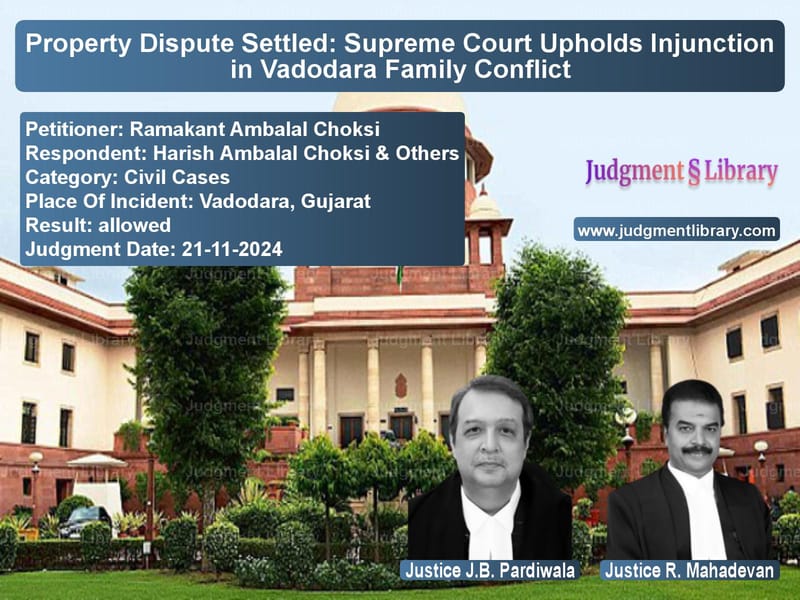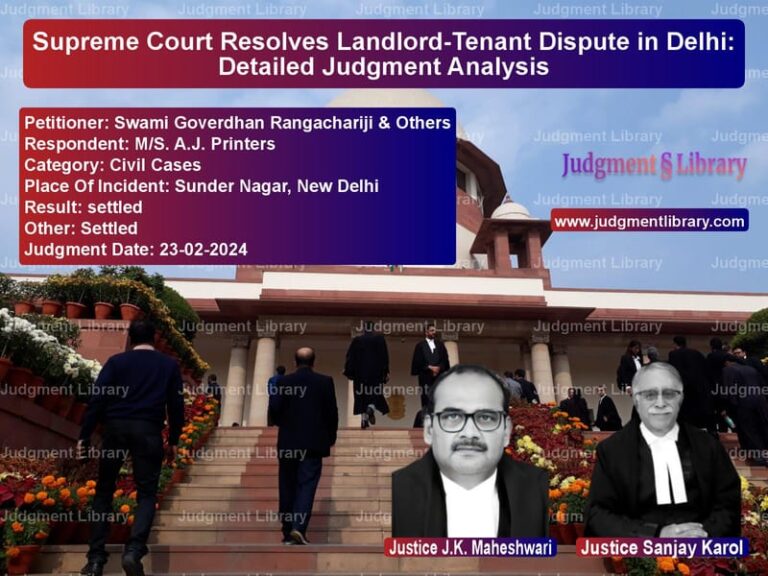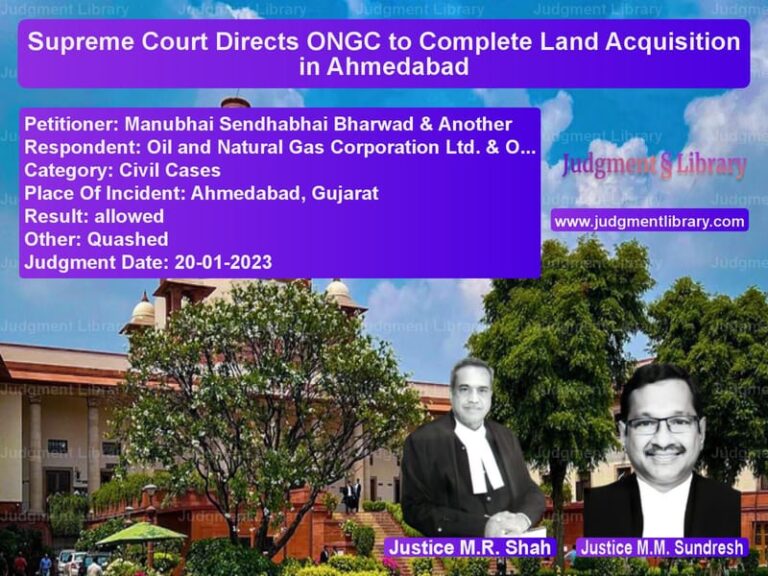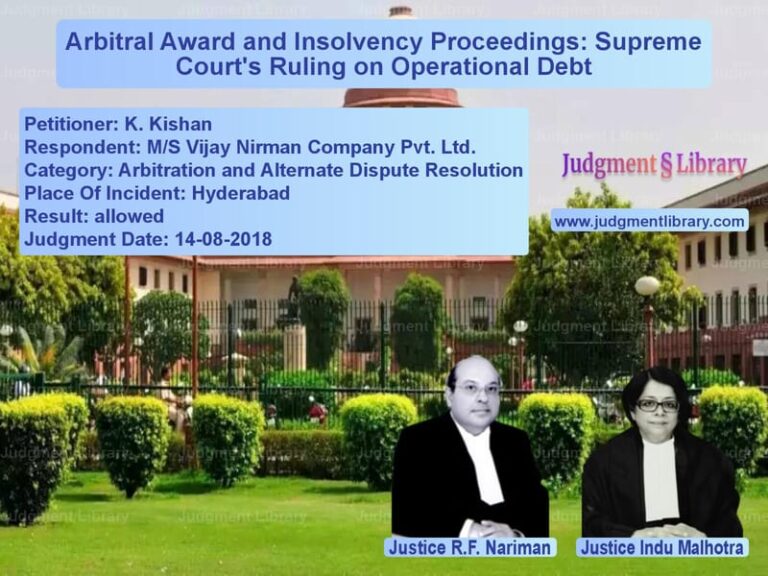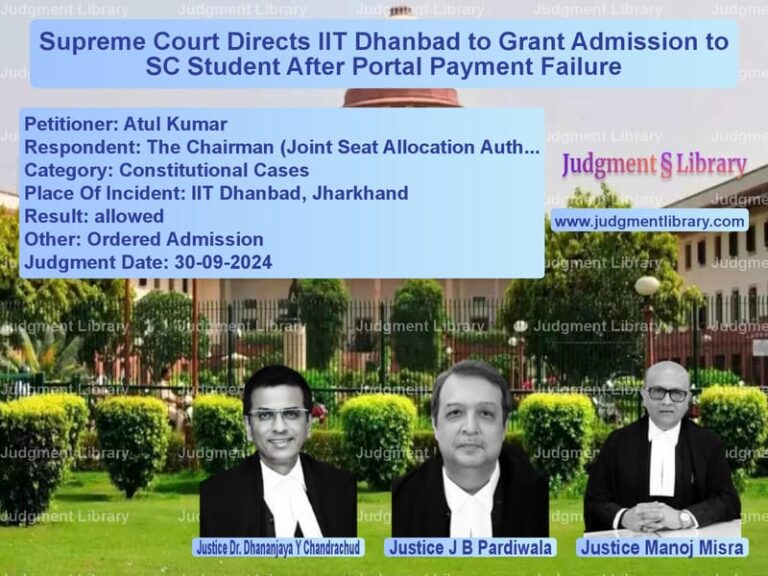Property Dispute Settled: Supreme Court Upholds Injunction in Vadodara Family Conflict
In a significant ruling, the Supreme Court of India has ruled in favor of the plaintiffs in a complex family property dispute in Vadodara, Gujarat. The case, Ramakant Ambalal Choksi vs. Harish Ambalal Choksi & Others, revolved around the alleged fraudulent sale of family property and the plaintiffs’ demand for an injunction to prevent further transactions. The Supreme Court set aside the Gujarat High Court’s order and reinstated the trial court’s decision granting an injunction in favor of the plaintiffs.
Background of the Case
The dispute centered around a property located in Sub-Plot No. 1, Navrang Co-operative Housing Society, Survey No. 549/2, Alkapuri, Vadodara. The plaintiffs and defendants are members of the same family, originally joint owners of the property. Over time, a conflict arose when defendant no. 1 allegedly misused a power of attorney from 1995 to execute a sale deed in favor of his son (defendant no. 3) without informing the other co-owners.
Key Issues in the Case
- Whether the power of attorney executed in 1995 authorized the defendant to sell the property.
- Whether the sale of the property at an undervalued price was fraudulent.
- Whether an injunction was necessary to prevent further transactions.
- The balance of convenience and irreparable harm to the plaintiffs.
Arguments of the Parties
Arguments by the Plaintiffs
The plaintiffs, represented by Ramakant Ambalal Choksi, contended:
- The property was purchased jointly in 1991 by the plaintiffs and defendant no. 1.
- The power of attorney given to defendant no. 1 was only for administrative purposes and not for selling the property.
- The sale deed, executed in 2018 in favor of defendant no. 3, was without their consent.
- The sale consideration mentioned in the deed was Rs. 1.70 crore, while the market value was over Rs. 20 crore.
- The defendants were attempting to create third-party rights, necessitating an injunction.
- The plaintiffs had already initiated criminal proceedings against the defendants for fraud.
Arguments by the Defendants
The defendants argued:
- The power of attorney was a legally valid document empowering defendant no. 1 to sell the property.
- The family business had financial disputes, and the sale was part of a family arrangement.
- The defendant no. 1 had an outstanding amount of Rs. 16.50 crore due from the plaintiffs.
- The plaintiffs were harassing the defendants by filing multiple cases, including criminal proceedings.
- The plaintiffs had failed to make out a prima facie case for an injunction.
Judicial Findings
Trial Court’s Decision
The trial court granted an injunction in favor of the plaintiffs, restraining the defendants from creating third-party rights over the property. It held:
- The plaintiffs had a prima facie case, as they were joint owners.
- The sale deed was executed without their consent, making it suspicious.
- The balance of convenience lay with the plaintiffs.
- Irreparable harm would be caused if the property was further alienated.
High Court’s Reversal
The Gujarat High Court overturned the trial court’s injunction, ruling:
- The plaintiffs had initiated multiple cases to harass the defendants.
- The injunction virtually decided the suit in the plaintiffs’ favor without trial.
- The family had existing financial disputes, making the sale legitimate.
Supreme Court’s Judgment
The Supreme Court reviewed the case and held that the High Court overstepped its jurisdiction. Key findings included:
- The High Court failed to show that the trial court’s order was perverse.
- The injunction was necessary to maintain the status quo.
- The High Court should not have substituted its view in an appeal against an interim order unless the order was arbitrary or perverse.
- Since the property had already been transferred, the trial court should decide whether the transaction was hit by lis pendens under Section 52 of the Transfer of Property Act.
Key Legal Principles Reaffirmed
The Supreme Court reiterated:
- Scope of Appellate Review: In an appeal against an interim order, the appellate court should only interfere if the order is perverse or arbitrary.
- Doctrine of Lis Pendens: Any transfer during litigation is subject to the final outcome of the case.
- Balance of Convenience: In cases involving family property disputes, the primary goal should be to preserve the property until a full trial.
Impact of the Judgment
This ruling reinforces the importance of maintaining the status quo in property disputes to prevent irreparable harm. The key takeaways are:
- Protection of co-owners’ rights: No co-owner can unilaterally sell joint property without consent.
- Strengthening interim relief principles: Courts must follow strict guidelines in reviewing injunctions.
- Fair adjudication: High Courts must not lightly set aside trial court injunctions unless they are arbitrary.
Conclusion
The Supreme Court’s decision in Ramakant Ambalal Choksi vs. Harish Ambalal Choksi & Others is a landmark ruling in property disputes. By restoring the trial court’s injunction, the Court has upheld the rights of co-owners and reinforced the importance of procedural fairness in interim relief applications. The case now returns to the trial court for final adjudication on the validity of the sale.
Read also: https://judgmentlibrary.com/supreme-court-upholds-property-rights-under-marumakkathayam-law/
Petitioner Name: Ramakant Ambalal Choksi.Respondent Name: Harish Ambalal Choksi & Others.Judgment By: Justice J.B. Pardiwala, Justice R. Mahadevan.Place Of Incident: Vadodara, Gujarat.Judgment Date: 21-11-2024.
Don’t miss out on the full details! Download the complete judgment in PDF format below and gain valuable insights instantly!
Download Judgment: ramakant-ambalal-cho-vs-harish-ambalal-choks-supreme-court-of-india-judgment-dated-21-11-2024.pdf
Directly Download Judgment: Directly download this Judgment
See all petitions in Property Disputes
See all petitions in Contract Disputes
See all petitions in Specific Performance
See all petitions in Judgment by J.B. Pardiwala
See all petitions in Judgment by R. Mahadevan
See all petitions in allowed
See all petitions in supreme court of India judgments November 2024
See all petitions in 2024 judgments
See all posts in Civil Cases Category
See all allowed petitions in Civil Cases Category
See all Dismissed petitions in Civil Cases Category
See all partially allowed petitions in Civil Cases Category

